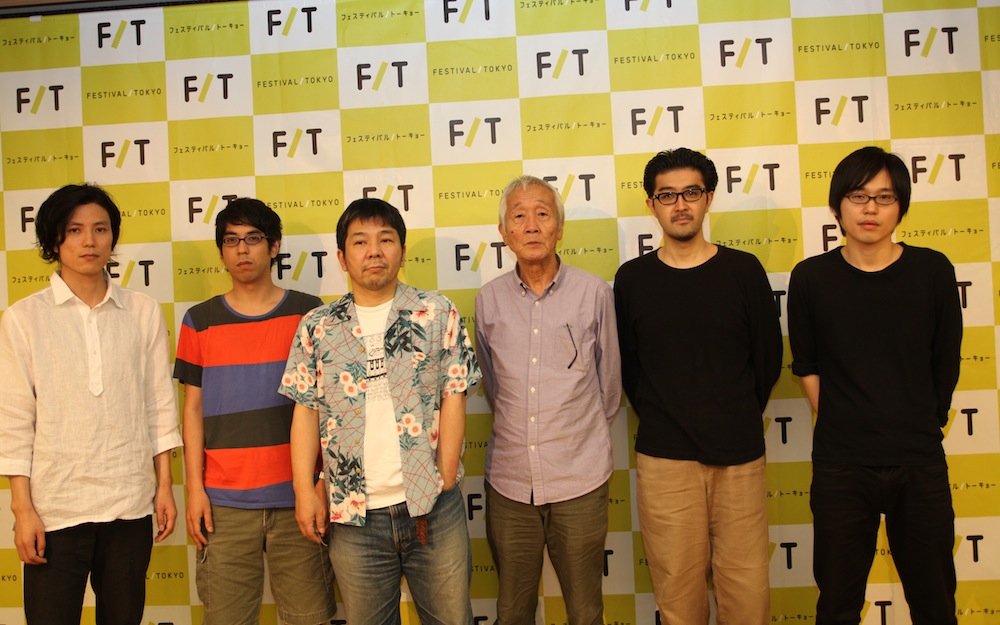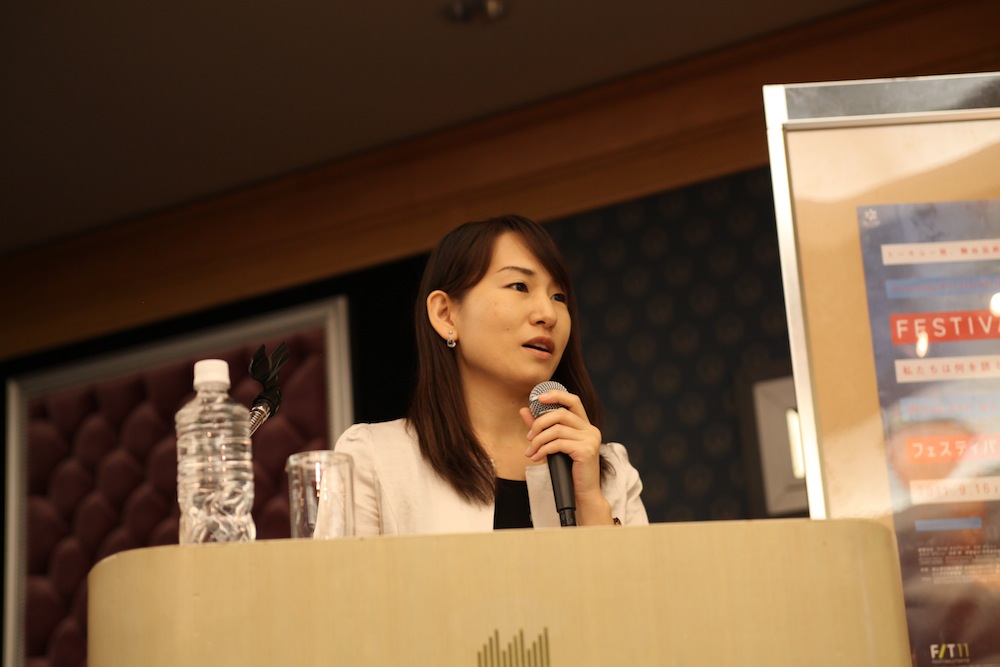News
News
F/T11 Press Conference Report
The F/T11 press conference on July 6 saw the artists Tsuyoshi Shirai, Yudai Kamisato (OKAZAKI ARTS THEATRE), Akio Miyazawa (U-enchi Saisei Jigyodan), Yukichi Matsumoto (Ishinha), Akira Takayama (Port B) and Yohei Kurose (CHAOS*LOUNGE) all gather together in Ikebukuro to discuss the upcoming autumn edition of Festival/Tokyo.
After having used the conference room in the Tokyo Metropolitan Art Space and the auditorium of the Jiyu Gakuen Myonichikan on previous occasions, the Cassiopeia Room in the third floor of the Tokyo Metropolitan Plaza hotel was chosen this time as the venue for the press conference, presenting the line-up of the fourth installment of the international theatre festival that has now grown into Japan's largest, with a total number of 65,000 visitors at the 2010 edition.
The 2011 Festival is scheduled to be held over a period of almost two months, from 16 September to 13 November. Although the number of productions presented by F/T has shrunk from around 20 in previous years to a more modest 13 this time, F/T11 presents a couple of works of a dimension never seen before. The double bill "ground" and "The Phenomenon Called I" by Norimizu Ameya and Romeo Castellucci respectively, will be staged in the open-air Multipurpose Colosseum in Yumenoshima Park in Tokyo Bay. Inspired by the texts of Kenji Miyazawa, "ground" and "The Phenomenon Called I" have the capacity to hold 1,000 spectators per performance. In the same way the large-scale "Cinecittà Aperta Ruhr Trilogy, Part 2" by René Pollesch is a site-specific work that will borrow the wasteland bordering the west side of Toyosu Park for its stage.

The main reason for the Festival to move out further into the city of Tokyo is practical: one of Festival/Tokyo's main venues, the Tokyo Metropolitan Art Space, is closed for renovation. In fact the tentative catch phrase for F/T11 used to be "Leave the theatre behind, go out into the streets!" However this was changed to "What can we say?", reflecting a certain feeling of helplessness in the aftermath of the 3.11 triple catastrophe.
Ichiro Momohara from the Tokyo Metropolitan Government opened the press conference by offering his condolences to all those who have lost someone in the disaster, also wishing for a quick recovery for the victims in the Tohoku area. He made it clear that it had been for a while uncertain whether F/T11 would have been held at all in the circumstances, but that in the end they decided to go through with the Festival without changes to either scale or budget.
Chairman of the F/T Executive Committee Sachio Ichimura said that it is in the power of the arts to question the way we are living, and the words of the government who tells us not to worry about the radiation and keep drinking the water coming out of our taps. It is the strength of art to give us hope in these times of hopelessness and maybe even offer an alternative reality.
Program Director Chiaki Soma (pictured below) called the disaster "a new grand narrative". The question is now how should F/T face this new reality. Should we talk publicly about it, or should we avoid it? Standing face to face with a new reality than has surpassed even fiction, what can we say? This is exactly why the Festival slogan was changed to "What can we say?" In particular, the two new works highlighted below are directly influenced by the recent circumstances. Although a part of the line-up included works already premiered, the audiences will also now see them through a new post-3.11 filter.

From the podium artist Akira Takayama talked about his overwhelming encounter with the Zwetendorf Nuclear Power Plant in Austria, which was prevented from ever being used by a referendum in 1978. Today the building stands as a monument to the power of the people. Playing with the irony that a plebiscite has never taken place in Japan, Takayama's new work takes as its point of departure the current dilemma of whether Japan needs nuclear power at all. "Referendum Project" is a participatory piece in three parts, bearing Takayama's trademark method of including the audiences in the performance, forcing them to make up a personal opinion and take a political standpoint.
Akio Miyazawa, leader of U-enchi Saisei Jigyodan, is also thematizing the threat that nuclear energy imposes on the human race. His new work "Total Living 1986-2011" presents the story of a man who is sentenced to 25 years in prison for a crime he committed in 1986. He is imprisoned in the same year as the Chernobyl accident and released in the year of the Fukushima incident. Against this background Miyazawa says that he intends to question our current way of living.
It remains to be seen not only at F/T11 but also in the years to come how the 3.11 catastrophe will influence the arts, and eventually the mindset of the general public. We hope that it will create a ripple effect that spreads beyond the borders of Tokyo and Japan.
by Tara Ishizuka Hassel
The 2011 Festival is scheduled to be held over a period of almost two months, from 16 September to 13 November. Although the number of productions presented by F/T has shrunk from around 20 in previous years to a more modest 13 this time, F/T11 presents a couple of works of a dimension never seen before. The double bill "ground" and "The Phenomenon Called I" by Norimizu Ameya and Romeo Castellucci respectively, will be staged in the open-air Multipurpose Colosseum in Yumenoshima Park in Tokyo Bay. Inspired by the texts of Kenji Miyazawa, "ground" and "The Phenomenon Called I" have the capacity to hold 1,000 spectators per performance. In the same way the large-scale "Cinecittà Aperta Ruhr Trilogy, Part 2" by René Pollesch is a site-specific work that will borrow the wasteland bordering the west side of Toyosu Park for its stage.
The main reason for the Festival to move out further into the city of Tokyo is practical: one of Festival/Tokyo's main venues, the Tokyo Metropolitan Art Space, is closed for renovation. In fact the tentative catch phrase for F/T11 used to be "Leave the theatre behind, go out into the streets!" However this was changed to "What can we say?", reflecting a certain feeling of helplessness in the aftermath of the 3.11 triple catastrophe.
Ichiro Momohara from the Tokyo Metropolitan Government opened the press conference by offering his condolences to all those who have lost someone in the disaster, also wishing for a quick recovery for the victims in the Tohoku area. He made it clear that it had been for a while uncertain whether F/T11 would have been held at all in the circumstances, but that in the end they decided to go through with the Festival without changes to either scale or budget.
Chairman of the F/T Executive Committee Sachio Ichimura said that it is in the power of the arts to question the way we are living, and the words of the government who tells us not to worry about the radiation and keep drinking the water coming out of our taps. It is the strength of art to give us hope in these times of hopelessness and maybe even offer an alternative reality.
Program Director Chiaki Soma (pictured below) called the disaster "a new grand narrative". The question is now how should F/T face this new reality. Should we talk publicly about it, or should we avoid it? Standing face to face with a new reality than has surpassed even fiction, what can we say? This is exactly why the Festival slogan was changed to "What can we say?" In particular, the two new works highlighted below are directly influenced by the recent circumstances. Although a part of the line-up included works already premiered, the audiences will also now see them through a new post-3.11 filter.
From the podium artist Akira Takayama talked about his overwhelming encounter with the Zwetendorf Nuclear Power Plant in Austria, which was prevented from ever being used by a referendum in 1978. Today the building stands as a monument to the power of the people. Playing with the irony that a plebiscite has never taken place in Japan, Takayama's new work takes as its point of departure the current dilemma of whether Japan needs nuclear power at all. "Referendum Project" is a participatory piece in three parts, bearing Takayama's trademark method of including the audiences in the performance, forcing them to make up a personal opinion and take a political standpoint.
Akio Miyazawa, leader of U-enchi Saisei Jigyodan, is also thematizing the threat that nuclear energy imposes on the human race. His new work "Total Living 1986-2011" presents the story of a man who is sentenced to 25 years in prison for a crime he committed in 1986. He is imprisoned in the same year as the Chernobyl accident and released in the year of the Fukushima incident. Against this background Miyazawa says that he intends to question our current way of living.
It remains to be seen not only at F/T11 but also in the years to come how the 3.11 catastrophe will influence the arts, and eventually the mindset of the general public. We hope that it will create a ripple effect that spreads beyond the borders of Tokyo and Japan.
by Tara Ishizuka Hassel
- topics
- August 17, 2011